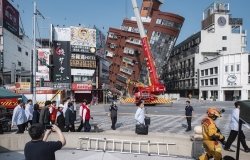Book Launch--A Moment of Crisis: Jimmy Carter, The Power of a Peacemaker, and North Korea's Nuclear Ambitions
Marion Creekmore, Jr., Emory University; Don Oberdorfer, SAIS, Johns Hopkins University (discussant)
Overview
Marion Creekmore, Jr., of Emory University, described how President Jimmy Carter, through direct, face-to-face contact with then North Korean leader Kim Il Sung in 1994, very likely averted a war. Discussant Don Oberdorfer of SAIS said that it would behoove the George W. Bush administration to send a high-level interlocutor to Pyongyang to discuss the current nuclear crisis with North Korean leader Kim Jong Il.
Creekmore, at an October 23 event, discussed the content of his new book, "A Moment of Crisis: Jimmy Carter, the Power of a Peacemaker, and North Korea's Nuclear Ambitions." The event was jointly sponsored by the Asia Program, Division of International Security Studies, and History and Public Policy Program, in cooperation with Los Alamos National Laboratory.
Creekmore noted that the first nuclear crisis with North Korea took place in 1994. At the time, the international community, especially the United States and the International Atomic Energy Agency (IAEA), wanted to know how much plutonium North Korea had separated from its five-megawatt reactor in Yongbyon. The IAEA also wanted to place the 8,000 rods in the reactor under safeguards, and inspect several North Korean waste sites. North Korea refused all these requests. The Clinton administration moved for United Nations Security Council economic sanctions against North Korea. The North Koreans responded that any such sanctions would be interpreted as an act of war. They also said they would expel all IAEA inspectors from their country. The Clinton administration began reinforcing its military presence in South Korea. Then, in May 1994, the North Koreans started discharging their spent fuel rods from the five megawatt reactor, presumably to reprocess them into weapons-grade plutonium.
At this point, Carter decided to visit North Korea, especially after members of the Clinton administration told him they would have no direct contact with North Korea until the latter "backed down." Carter felt there was a real chance of war, and decided he had to do something. Above all, he wanted to find out if the North Korean threat of war was real or not. The Clinton administration reluctantly agreed to the trip, provided Carter made it clear to the North Koreans that he was going as a representative of the Carter Center, not as an emissary of the administration.
Carter and a small entourage, including Creekmore, departed for Seoul on June 12. On June 15, they crossed the demilitarized zone into North Korea. Carter's historic meeting with North Korean leader Kim Il Sung took place the morning of June 16. It was clear to Creekmore that Kim Il Sung was looking for a way out of the crisis. The North Korean leader agreed to freeze his entire nuclear program for the length of positive bilateral talks with the United States, and agreed to keep the IAEA inspectors in North Korea. In return, he wanted economic assistance, including the provision of two light-water power reactors to generate electricity. He also mentioned that bilateral talks might lead to diplomatic relations, and added the desire for a pledge that the United States would not attack North Korea with nuclear weapons. Carter explained to Kim that he had no authority in this matter, but told Kim that he would take the North Korean's offer back to the United States.
Although there was initial dissent and controversy within the Clinton administration over Carter's discussions with Kim, after a few days Carter was told that if the North Koreans repeated their offer through diplomatic channels, the administration would be willing to begin negotiations. The North Koreans did so, the Clinton administration entered into bilateral negotiations, and the result was the October 1994 Agreed Framework. Creekmore concluded that, in his opinion, Carter's intervention prevented a war, and he hoped that in the future those dealing with North Korea would reflect seriously on Carter's experiences and approach, even if their political philosophy differed from that of the former president.
Don Oberdorfer stated that Carter's trip in 1994 has "lots of relevance to today." Oberdorfer said that it simply makes no sense, when faced with a major crisis, not to talk to the leader on the other side. He noted that he visited North Korea in the fall of 2002, shortly after the Bush administration made known to North Korea that it was aware of North Korea's highly enriched uranium program. He was given a written message from Kim Jong Il to convey to President Bush.
Oberdorfer passed the message to then deputy national security advisor Hadley. The message, according to Oberdorfer, offered that if the United States provided a guarantee of nonaggression and ended its hostile policy, all outstanding issues could be resolved. Hadley's reaction was that direct negotiations with the North Koreans "would be rewarding bad behavior."
Oberdorfer said that at present, we need another Jimmy Carter, somebody to take the political risk and go to North Korea. He concluded that it was incredible and dangerous, in a crisis, not to be willing to speak to the only person who could make decisions and possibly "diffuse this thing."
Drafted by Mark Mohr, Asia Program Associate
Robert M. Hathaway, Director, Asia Program. Ph: (202) 691-4020
Hosted By

Indo-Pacific Program
The Indo-Pacific Program promotes policy debate and intellectual discussions on US interests in the Asia-Pacific as well as political, economic, security, and social issues relating to the world’s most populous and economically dynamic region. Read more
Thank you for your interest in this event. Please send any feedback or questions to our Events staff.










